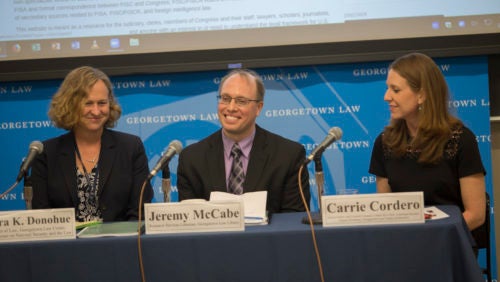Center on National Security and the Law Launches Online, Searchable Database of Foreign Intelligence Law
May 24, 2019

Professor Laura Donohue, Research Librarian Jeremy McCabe and Adjunct Professor Carrie Cordero launched the Center on National Security's Foreign Intelligence Law Collection. The center's Executive Director, Nadia Asancheyev, introduced the panel.
On May 23, Georgetown Law’s Center on National Security and the Law launched the Foreign Intelligence Law Collection — a publicly available, online searchable database of all declassified and redacted U.S. Foreign Intelligence Surveillance Court and Court of Review opinions; all Foreign Intelligence Surveillance Act (FISA) statutes; legislative history; associated regulations, guidelines, executive orders, and presidential directives; all publicly available reports on FISA implementation, and more.
“It was built as a resource for…anyone and everyone seeking to know more about foreign intelligence law,” said Nadia Asancheyev, the center’s executive director.
The practitioners and academics who came to inspect the product clearly welcomed the new resource, which will also be useful to journalists, government lawyers, members of Congress and their staffers.
Adjunct Professor Carrie Cordero, senior fellow and general counsel of the Center for a New American Security — who moderated the discussion with Professor Laura Donohue and Research Librarian Jeremy J. McCabe — called the collection “an incredible public service.”
“I was a FISA practitioner, and if only there had been a resource like this…,” Cordero said, adding that the practitioners, those who practice before the court, the judges, the law clerks…”not even to mention the academic and scholarly community, and journalistic community [will] be interested in this valuable collection.”
Where the law is
In 2015, the FISA Court appointed Professor Donohue as one of five amici curiae under the USA FREEDOM Act. Amici are leading experts in national security and constitutional law who lend their expertise to the court, in areas ranging from civil liberties and privacy to intelligence collection.
“Last February, I was appointed by the court in a public case before it [and the question was] whether the public has a right to their judicial opinions,” Donohue said. “What struck me at the time was, of course they do — this is the law, and having access to it is at the heart of rule of law.”
Documents in the public domain related to foreign intelligence surveillance law, however, were scattered all over the Internet, unsearchable, and with different pages redacted in different versions; it was hard to cite to anything. “I was very concerned that the public could not actually figure out how the law was working.”
So Donohue decided to do something about it. She worked closely with McCabe to build the website and to scour the Internet to find all of the relevant materials.
“I don’t know if it’s appropriate to say, ‘it was awful,’” joked McCabe, who worked on the database with Donohue and Leah Prescott, Associate Law Librarian for Digital Initiatives and Special Collections. “But it was awful. There were so many different places where a [document] could be found…and I’d have to read [the entire document] to find out, what is this about? Is it relevant?”
From 1978 — the year the FISA Court was established by Congress — to 2002, the FISC/FISCR issued one publicly available opinion. Since then, there have been more than 70 released, and more than 270 orders. With changes made by the USA PATRIOT Act, in concert with a FISCR opinion, FISA can now be used to collect evidence of wrongdoing, even when the primary aim of the investigation is criminal in nature. There are now more cases in non-specialized Article III courts than in FISC/FISCR relating to FISA, and the database includes these opinions as well.
While the collection does not contain leaked documents, some of the documents it does contain were made public following the public outcry that accompanied Edward Snowden’s leaks in June 2013. In the year that followed, roughly 60 percent of all the FISC’s current public docket was filed — while Congress, in turn, entertained 43 bills that would have made far-reaching changes to FISC/FISCR and the FISA process. (The prior year, there had been only 3 bills regarding expiring legislation).
The current launch timing could not be better, as three FISA provisions — including the highly controversial section 215 — are due to sunset on December 15, 2019. This year, for the first time, public and congressional debate can be deeply informed by the statutory and judicial materials, and the reports housed in the database, which detail how the government has used — and at times misused — their authorities. An annotated bibliography has been provided as part of the collection.
Invaluable
Visiting Professor M. Tia Johnson, who directs Georgetown Law’s National Security Law LL.M. program and who is a visiting fellow at the Center on National Security, said the new resource will also be invaluable for students of national security law. “I say, you have got to understand two things when you look at FISA: that almost every provision of FISA is reactionary, and Congress was not about reinventing the wheel, so they generally looked to whatever the criminal law corollary was, and planted it in the foreign intelligence context,” she noted.
Johnson also remarked that students will be able to examine enacted and amended versions of statutes.
“In my syllabus…sometimes I will cite the public law, and sometimes I will cite the codified version… because if we have a FISC opinion, the FISC is looking at the law as it was enacted at the time,” Johnson said. “The FREEDOM Act comes along…and you’re reading the FREEDOM Act version, not as it was enacted. So it’s vitally important that students and practitioners understand the various iterations.”